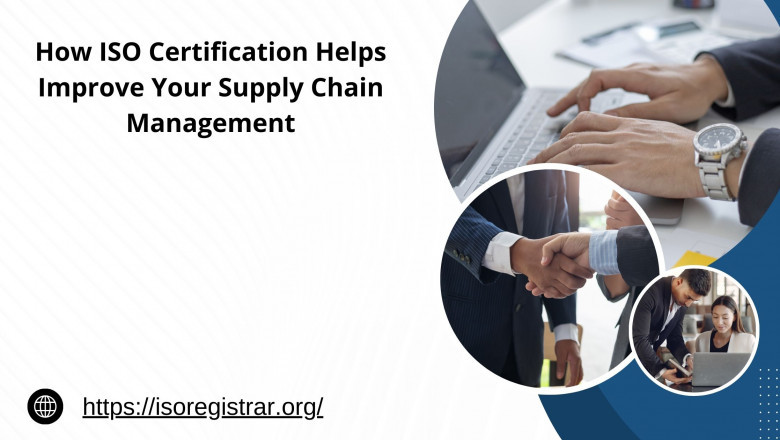views
Introduction
In today’s highly competitive business landscape, effective supply chain management (SCM) is not just a requirement — it's a strategic advantage. Whether you're managing procurement, logistics, production, or delivery, the efficiency and reliability of your supply chain determine your business’s overall performance. One powerful way to enhance your supply chain is by obtaining ISO Certification. The International Organization for Standardization (ISO) develops internationally recognized standards that promote quality, efficiency, and safety across various industries. For businesses seeking to optimize their supply chain, ISO certification offers a framework to implement best practices that drive long-term success.
What is ISO Certification?
ISO certification is a formal recognition that a company’s processes, systems, or products meet specific international standards. Some of the most relevant ISO standards for supply chain management include:
-
ISO 9001 – Quality Management Systems
-
ISO 14001 – Environmental Management Systems
-
ISO 45001 – Occupational Health and Safety
-
ISO 28000 – Supply Chain Security Management
-
ISO 31000 – Risk Management
These certifications assure that your business follows consistent and standardized procedures that improve efficiency and reduce operational risk.
Enhances Supplier Reliability
ISO standards require businesses to establish a structured process for evaluating and managing suppliers. ISO 9001, for instance, emphasizes performance-based supplier evaluations, ensuring you work only with partners who meet your quality expectations. This leads to:
-
Better vendor accountability
-
Fewer production delays due to supply issues
-
Reduced costs related to rework or product defects
As a result, your supply chain becomes more reliable and agile, allowing you to meet customer demands on time.
Standardizes Processes Across the Supply Chain
ISO certification promotes uniform procedures, documentation, and communication. When every stakeholder in your supply chain adheres to a standardized process, it reduces confusion and human errors. This ensures:
-
Streamlined workflows
-
Consistent product or service quality
-
Easier onboarding of new suppliers or logistics partners
ISO 9001 helps define standard operating procedures (SOPs) that improve collaboration between departments and external vendors.
Improves Risk Management
Supply chains are often exposed to various risks — natural disasters, supplier failure, cyberattacks, or regulatory non-compliance. ISO 31000 and ISO 28000 standards provide frameworks for identifying, assessing, and mitigating these risks.
By integrating risk management into your supply chain strategy, you gain:
-
Early warning systems for potential disruptions
-
Contingency plans for emergencies
-
A proactive approach to managing change and uncertainty
This level of preparedness can mean the difference between a minor hiccup and a major crisis.
Boosts Customer Satisfaction
ISO certification helps businesses deliver better-quality products consistently. A smooth supply chain means fewer errors, faster delivery times, and improved responsiveness to customer needs. Happy customers lead to:
-
Repeat business
-
Positive word-of-mouth
-
Stronger brand reputation
Moreover, some clients specifically require ISO certification from their suppliers, making it a valuable asset for retaining and expanding your customer base.
Drives Continuous Improvement
One of the core principles of ISO standards is continuous improvement. Regular audits, performance reviews, and feedback collection are required to maintain certification. This continuous loop encourages businesses to:
-
Identify and fix process inefficiencies
-
Adapt quickly to market changes
-
Innovate in production, logistics, and customer service
By fostering a culture of improvement, ISO certification keeps your supply chain flexible and future-ready.
Promotes Environmental and Ethical Responsibility
Modern consumers and partners are increasingly interested in sustainability and ethical practices. ISO 14001 encourages businesses to minimize environmental impact throughout the supply chain. Similarly, ISO 45001 focuses on employee safety and welfare.
With these standards in place, companies can:
-
Reduce waste and carbon emissions
-
Improve workplace safety and employee satisfaction
-
Gain recognition as an environmentally and socially responsible brand
This not only benefits the planet but also attracts like-minded partners and customers.
Supports Global Expansion
If you're looking to enter international markets, ISO certification is a major advantage. Many global businesses and governments require certified suppliers for partnerships or tenders. ISO gives you:
-
Instant credibility in foreign markets
-
Easier compliance with international trade regulations
-
A smoother path to building global supply networks
By aligning your supply chain with global standards, you position your business for cross-border success.
Increases Operational Efficiency and Reduces Costs
An ISO-certified supply chain eliminates redundancy, waste, and non-value-added activities. By clearly defining roles, procedures, and performance metrics, companies can:
-
Optimize inventory management
-
Lower production and storage costs
-
Improve transportation and logistics planning
Note: You can also ISO 9001 Certificate from our website
Conclusion
ISO certification is more than just a formal stamp of approval — it’s a strategic tool for optimizing your supply chain management. From enhancing supplier relationships to reducing risks and improving customer satisfaction, ISO standards bring structure, transparency, and resilience to your operations. Whether you're a manufacturer, distributor, service provider, or retailer, investing in ISO certification can significantly improve your supply chain’s performance, sustainability, and global competitiveness. In a world where every second counts and quality is non-negotiable, ISO helps ensure your supply chain is built to deliver excellence every step of the way.














Comments
0 comment